The work of Bakhtin was disclosed to me by Will McWhinney. He used Bahktin in one of the many versions of his never published book Grammars of Engagement.
The discovery of Bahktin started with a book about Bahktin by Saul Morson & Caryl Emerson. Later I also read many other books and articles like “The dialogical imagination”, “Towards a philosophy of the act”, “Discourse in the Novel”, “Rabelais and His World”, “Problems of Dostoevsky’s Poetics” and “Speech Genres and Other Late Essays”.
Bahktin invented the term Chronotope, “The place where the knots of narrative are tied” or “the intrinsic connectedness of temporal and spatial relationships that are artistically expressed in literature“. Currently we use the term Content or Media for Literature.
A Chronotope is a Topological Concept
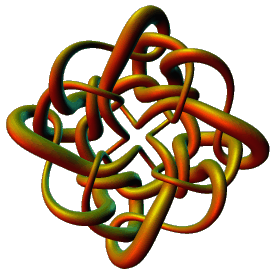 Space (Place, Location) and Time (the narrative) are connected by a Knot. A knot is a complicated twist in a rope. The twist is needed when you want to close a system in itself. The simplest topological structure that visualizes twisted space/time is the Moebius Ring.
Space (Place, Location) and Time (the narrative) are connected by a Knot. A knot is a complicated twist in a rope. The twist is needed when you want to close a system in itself. The simplest topological structure that visualizes twisted space/time is the Moebius Ring.
The Chronotope is the Centre out of which every narrative that we are able to tell is enfolding and unfolding. It produces narratives and absorbs narratives. Bahktin places Folk-Lore, Myth, the Language of the People, in the Centre.
Every narrative contains a twist, a moment where the expansion of the beginning turns to the contraction of the end. It is the moment where the narrative is balanced. The reader holds his breath. It is also the moment where the narrative is aware of itself. It observes the whole.
Sometimes the twist is in the end. You know “who done it”. Sometimes the narrative starts with the twist. There are even narratives without a twist. You know all the time what will happen.
Scientists don’t realize that a scientific article is also a narrative. They use citation to prove they are telling a true story. Funny enough scientific citation has created the Internet. A hypertext is nothing but a citation-structure.
Old narratives produce new narratives. This is always accomplished by Citation. “The word in language is half someone else’s. It becomes “one’s own” only when the speaker populates it with his own intention, his own accent, when he appropriates the word, adapting it to his own semantic and expressive intention. Prior to this moment of appropriation, the word does not exist in a neutral and impersonal language. . . but rather it exists in other people’s mouths, in other people’s contexts, serving other people’s intentions: it is from there that one must take the word, and make it one’s own“”. The cursive sentence between brackets is a citation of Bahktin.
New narratives also oppose old narratives. They are Dialogic. “The entire life of language, in any area of its use . . . is permeated with dialogic relationships“.
Dialogues are converging (Socratic dialogue), diverging and conflicting (Menippian Dialogue) or one sided (the Magisterial Monologue). “Thus at any given moment of its historical existence, language is heteroglot from top to bottom: it represents the co-existence of socio-ideological contradictions between the present and the past, between differing epochs of the past, between different socio-ideological groups in the present, between tendencies, schools, circles and so forth”
The Centre generates new narratives all the time. They are a mix of the old and the new. The centre is the Centrifugal Force and this force is powered by Contradiction.
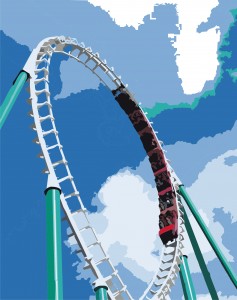 The Institutions, the Ruling Power, are constantly trying to standardize (the Centripetal force). They formulate rules and try to transform the dialogue into a monologue.
The Institutions, the Ruling Power, are constantly trying to standardize (the Centripetal force). They formulate rules and try to transform the dialogue into a monologue.
The centripetal and the centrifugal force create a huge tension. This tension moves the Wheel of Creation. The wheel always moves through the stages of Order and Chaos. In the middle of the Tornado of Creation is the Centre, the Chronotope. In the centre you will always find rest and inspiration.
The monologue (the magisterial dialogue) is the dialogue of the Magister, the scientist, the manager, the judge, the physician and the teacher. They use science, the law, books or other Magisters to enforce their power. By formulating rules they try to destroy the creative centre (the context).
“A context is potentially unfinalized; a code must be finalized. A code is only a technical means of transmitting information; it does not have cognitive, creative significance. Code is deliberately killed context“.
At this moment the Centripetal force is implemented in the Search Engine. Narratives are found by typing codes. This makes it very difficult to find a context. Companies like Google are manipulating the coding. They are paid by the Centripetal Force of the Commercial Companies.
The centrifugal force is never at rest. It always generates new alternatives. The creation of new literature is not bounded by rules. Every time a new structure is defined the Centre starts to play with the rules and generates a new combination. The Centre is not only combining rules it even invents new rules. The Centre is the inventor of new Games to Play.
Producing literature is a process of spiralling out. It follows a cycle but at a certain point in time a new Centre appears and the Cycle starts a new process of Folk-lore. The new centre is always connected to the old Centre. New myths and new fairy tales are created that are a representation of the Spirit of the Time.
Every cycle is governed by a Clock. The periodicity of the Clocks is determinated by the number five. It runs at a frequency of 1250, 250, 50, 10 or 2 years. There are frequencies that are moving faster (the Atom) and much slower (the Universe).
Bahktin has developed a very interesting theory about the development of the Chronotopes in history.
I will tell the Tale of the Chronotopes of Bahktin on the level of the Cycle of Culture (1250 years, 250 years per stage).
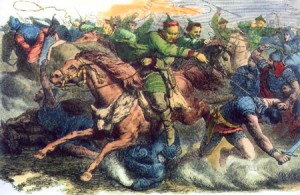 Between 450 and 700 the Roman Empire is destroyed by the Huns. It is the time of the Great Deportations. People out of Asia move to the West. They are the ancestors of the Ostrogotes, the Visigotes, the Franks, the Gauls, the Germans and the Celts. 1250 years later they are integrated in what we now call Europe. Between 700 and 2000 the Europeans explore and conquer the World.
Between 450 and 700 the Roman Empire is destroyed by the Huns. It is the time of the Great Deportations. People out of Asia move to the West. They are the ancestors of the Ostrogotes, the Visigotes, the Franks, the Gauls, the Germans and the Celts. 1250 years later they are integrated in what we now call Europe. Between 700 and 2000 the Europeans explore and conquer the World.
Around 1200 the new powers have created many Kingdoms and have organized the Crusades to conquer the Holy Land. To show their power they build the Cathedrals. The Cathedrals are the instrument of the Education of the Masses. The old folk-lore is transformed to the new of the Christian Faith. The old-folklore is not destroyed. Many symbols and important events are preserved. They are cited. The transition of the Sun in Winter is transformed in Christmas. The new apostles are connected to the old animals of the old Wheel of Fortune.
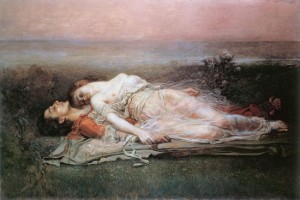 Between 1200 and 1450 the Chronotope of the Greek Romance (Tristan and Isolde, Arthur and The Grail) appears. It is the Chronotope of Being and Destiny. “There are a lot of suddenly’s”. Everything happens. The actor in this Chronotope is without identity. He is tested by destiny. When he has passed the test he is not changed. There is no time and space. Time (“adventure-time”) is reversible. The actors are public figures and space is public space. In the narratives we are able to see and hear everything.
Between 1200 and 1450 the Chronotope of the Greek Romance (Tristan and Isolde, Arthur and The Grail) appears. It is the Chronotope of Being and Destiny. “There are a lot of suddenly’s”. Everything happens. The actor in this Chronotope is without identity. He is tested by destiny. When he has passed the test he is not changed. There is no time and space. Time (“adventure-time”) is reversible. The actors are public figures and space is public space. In the narratives we are able to see and hear everything.
We are in the Middle Ages. In the outside world destiny is also playing its evil game. Western Civilization is almost destroyed by the plague, feminine and wars between the Kingdoms. Even the Christian Empire of Rome is divided by a schism (Byzantium). At the end only a few Kingdoms survive. These Kings become Emperors. They represent God on Earth.
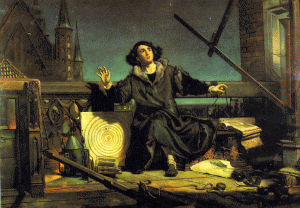 This (1450-1700) is the time of the Chronotope of the Adventure. It is the Chronotope of Becoming. The identity of the actor is transforming. He is responsible for his own actions. Life is full of turning points (twists). The actor wants to take control of the outside world. Space becomes “private space”.
This (1450-1700) is the time of the Chronotope of the Adventure. It is the Chronotope of Becoming. The identity of the actor is transforming. He is responsible for his own actions. Life is full of turning points (twists). The actor wants to take control of the outside world. Space becomes “private space”.
To give the reader insight in what is happening the Observer is introduced. He is a voyeur, a prostitute, a rambler, a rover, a tramp, a spy, a servant or an animal. The observer is not influencing the story at all. He is just watching. Objectivity is also introduced in space (court).
In the outside world we are in the Time of Renaissance (the Era of Discovery). It is the time of new inventions in Science (Copernicus), Art (Leonard Da Vinci) and Religion (Reformation, Luther, Calvin). The Bible is translated in the language of the people. It is also the time of the Great Explorations (Columbus) of the world outside the West. Western Culture starts his quest to control Nature and eventually the World.
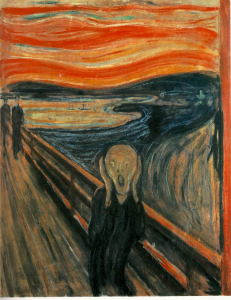 The next Chronotope is the Biography (1700-1950), the praise of a public figure who has accomplished something in life. We are moving from the outside world to the inside world of the actor.
The next Chronotope is the Biography (1700-1950), the praise of a public figure who has accomplished something in life. We are moving from the outside world to the inside world of the actor.
Inner space is closed. “This offers a new relationship to one’s own self, one’s own particular “I”- with no witnesses, without any concessions to the voice of a “third person“.
Outside events affect the inner world. The actor is not showing this. In the outside world the actor is judged by his actions and not by his inner space (his essence). “The essence of man is realized not by his condition but by his activity“.
To give the reader a view on the inner space the outsider is introduced. His outside actions are governed by a distorted inner space. The outsider (the fool, the eccentric) acts as a reference.
The actor is a pretender. He is constantly in doubt, grumbling, cynical and sarcastic. He is also passive. He is watching from a distance. Everything is Relative (Bahktin was a fan of Einstein). The only time when the actor is able to show himself is at the carnival. During this short period he is allowed to choose his own mask.
This is the time of the Industrial Revolution. It is the era of mechanization. It starts with the invention of the Mill and the Factory. It ends with the mechanized Consumer watching Television.
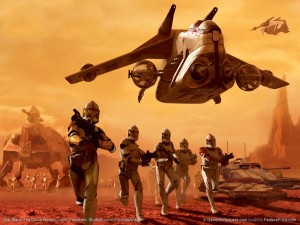 Starting in 1950 we are again in the phase of Folk-lore. Western Civilization is moving to a new Centre, Earth.
Starting in 1950 we are again in the phase of Folk-lore. Western Civilization is moving to a new Centre, Earth.
New myths and legends will be created. They have to be based on all the tales, myths and legends that are available on Earth. Some of them will be a citation. Others will be an opposition.
All kinds of dialogues will take and have to take place. We will experience many conflicts (Mennipian Dialogue). We will also have to listen and ask questions to understand the other cultures (Socratic Dialogue). We have to stop our Western Magisterial Monologue.
In the beginning it will be a Heteroglossia (a many voicedness), a very complicated Knot we have to untie. When we have found the tread we will be able to weave a new web of narratives that will start the phase of the Greek Romance again.
Between now and 2100 “We must make the new by our own effort”.“We have to face problems of reality and human potential, problems of freedom and necessity, and the problem of creative initiative“. We have to become persons “who emerge along with the world and reflect the historical emergence of the world itself”.
“In order to understand, it is immensely important for the person who understands to be located outside the object of his or her creative understanding — in time, in space, in culture. . . . Our real exterior can be seen and understood only by other people, because they are located outside us in space and because they are others”
We have to write our own Novel. “There is no causality in novels, no genesis, no explanations based on the past, on the influences of the environment or of upbringing and so forth. Every act a character commits is in the present, and in this sense is not predetermined”.
We have to act without hesitation and leave history behind. There is no experience we can reuse. The future is unfinalized (open).
The Magisters are not able to tell us what to do. They are out of tricks. We have to put off our own masks and take responsibility for what we are doing. “There is no alibi for being”. We have to stop pretending and use citations of others to prove we are right.
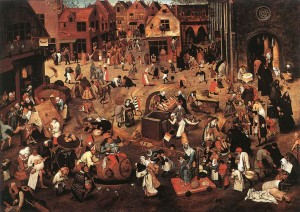
We are now part of the Worldwide Carnival of Fools. Choose your mask out of the many masks that are available all over the world. Listen to the stories of other cultures and be surprised about the beauty and the experience they are containing. Give the Fools and the Eccentrics, the Outsiders, a chance to help you.
Laugh.
It will be fun.
I want to close with a citation of Paul Feyerabend (Killing Time (1995)): “People, intellectuals especially, seem unable to be content with a little more freedom, a little more happiness, a little more light. Perceiving a small advantage, they seize it, circumscribe it, nail it down, and in this way prepare a New Age of ignorance, darkness and slavery. It is rather surprising that there are still people who want to help others for personal reasons, because they are kindhearted and because they have not been intimidated by principles. It is even more surprising that some of the people can work in institutions despite the greed, the incompetence, the power struggles that seem to surround the noblest cause.”
Do you want to know more about Feyerabend read The Act of Creation: About Fusion and Con-fusion
LINKS
About the Fool in African Myths
About Fools, Pyramids and Bubbles
